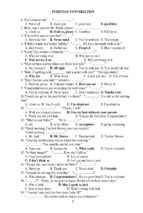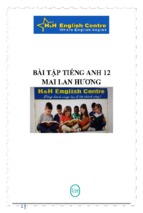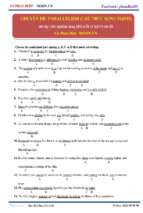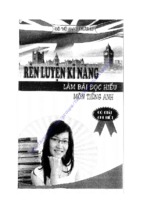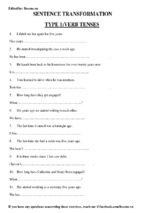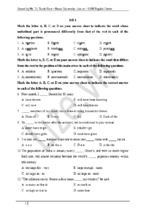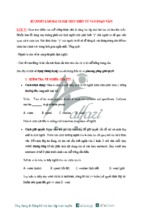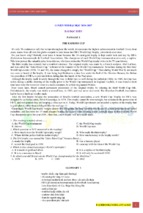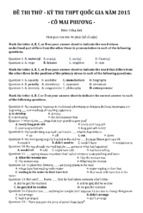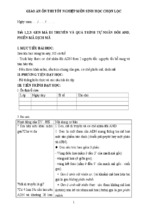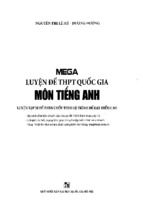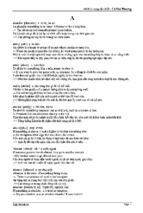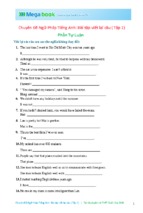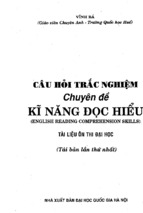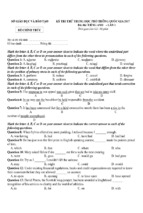SỞ GIÁO DỤC VÀ ĐÀO TẠO
ĐỀ CHÍNH THỨC
KỲ THI THỬ TRUNG HỌC PHỔ THÔNG QUỐC GIA 2017
Bài thi: TIẾNG ANH - LẦN 1
Thời gian làm bài: 60 phút
Họ và tên thí sinh: ……………………………………
Số bao danh: ……………… Phòng thi: ……………..
Mark the letter A, B, C or D on your answer sheet to indicate the word whose the underlined part
differs from the other three in pronunciation in each of the following questions.
Question 1: A. scheme
B. orchestra
C. mechanic
D. chimney
Question 2: A. laughed
B. practiced
C. raised
D. watched
Mark the letter A, B, C or D on your answer sheet to indicate the word that differs from the other three
in the position of primary stress in each of the following questions.
Question 3: A. perform
B. reduce
C. cancel
D. forgive
Question 4: A. company
B. uniform
C. establish
D. dinosaur
Mark the letter A, B, C or D on your answer sheet to indicate the underlined part that needs correction
in each of the following questions.
Question 5: The response to our appeal was such great that we had to take on more staff.
A
B
C
D
Question 6: In no way can the bus driver be held responsible from the accident.
A
B
C
D
Question 7: It has been announced that for a third consecutive month there has been a rise in the
A
B
C
number of people unemployed.
D
Mark the letter A, B, C or D on your answer sheet to indicate the correct answer to each of the
following questions.
Question 8: When Sylvia offered me more pudding, I refused because I _______ enough.
A. was having
B. had
C. have had
D. had had
Question 9: He has just won the first prize in English speaking contest, _______ made his parents proud
of him.
A. which
B. that
C. where
D. who
Question 10: Mary asked Helen if she _______ out for a walk the next evening.
A. went
B. goes
C. would go
D. had gone
Question 11: Try as I _______, I couldn’t lift the suitcase.
A. may
B. might
C. could
D. would
Question 12: Under existing financial regulations, banks and credit organizations are required to know
their customers before they are allowed _______ an account.
A. to open
B. opening
C. to have open
D. have opened
Question 13: David Peters, the Scottish long-jumper, has been awarded a kinghthood _______
recognition of his services to charity and the world of athletics.
A. in
B. for
C. on
D. with
Question 14: I derive a lot of _______ from collecting different stamps.
A. pleasant
B. pleased
C. pleasure
D. pleasing
Question 15: She left the office because she didn’t _______ the people there.
A. keep pace with
B. go down to
C. run out of
D. get on with
Question 16: When the twins dress the same, I can’t tell them _______.
A. against
B. off
C. by
D. apart
Mark the letter A, B, C or D on your answer sheet to indicate the most suitable response in each of the
following situations.
Question 17: -Johnsy: “Mary is the best singer I have ever known”.
-Franse: “ _______”
A. I couldn’t agree with you more.
B. That’s an absurd idea!
C. Why not?
D. Yes. That’s a good idea.
Question 18: -Mother: Let me congratulate you on passing the entrance examination.
-Son: “ _______”
A. Sorry. I can’t pass with flying colours
B. Thank you very much, Mom.
C. Do I have to?
D. Don’t mention it. I need some gifts.
Mark the letter A, B, C or D on your answer sheet to indicate the correct answer in each numbered
blank to complete the following passage.
It’s not always easy to decide which sport to (19) _______ up. When choosing, it’s
important to remember that exellence in sports results from (20) _______ of factors. For some
sports, the body shape and structure with which you are born are important. Top runners are
(21) _______ examples of individuals who have selected a sport because of their natural body
shape. Many other sports are more dependent on training and technique, and anyone following a
well-structured and approriate training programmes should do well.
The aim of all sports training is to improve fitness and skills, and to develop training skills
that are both safe and effective. To (22) _______ this properly, an understanding of the physical
demands of sports is needed. All sports require a (23) ________ of strength, spirit, endurance,
agility and flexibility to varying degrees.
Question 19: A. make
B. look
C. take
Question 20: A. a number
B. an amount
C. the quality
Question 21: A. common
B. popular
C. ordinary
Question 22: A. conduct
B. do
C. achieve
Question 23: A. combination
B. interaction
C. seperation
Mark the letter A, B, C, or D to indicate the sentence that is closest in meaning to
following questions.
Question 24: They never made us do anything we didn’t want to do.
A. We had never been made to do anything we didn’t want to do.
B. We were never made to do anything we didn’t want to do.
C. We were never allowed to do anything we wanted to do.
D. We were never made do anything we didn’t want to do.
Question 25: The worker only called off the strike after a new pay offer.
A. Not until a new pay was offered, the workers called off the strike.
D. hook
D. great deal
D. typical
D. play
D. connection
each of the
B. The worker called off the strike only when a new pay offers.
C. A new pay was offered, which made the strike call off.
D. Not until a new pay was offered did the workers call off the strike.
Question 26: "Don't forget to give the book back to Mary", said he.
A. He advised me to give the book back to Mary.
B. He reminded me to forget to give the book back to Mary.
C. He reminded me to give the book back to Mary.
D. He advised me to forget to give the book back to Mary.
Read the following passage and mark the letter A, B, C or D to indicate the correct answer to each of
the questions.
Although people drive in all countries, the rules can be quite different between nations
and areas. For this reason, you should always learn the laws before you decide to drive in a
foreign country. If you are not careful, you can get into trouble since the rules might be very
different from what you are used to. For example, you can find some big differences in laws
related to the minimum driving age, the appropriate side of the road to drive on, and mobile
phone use while driving.
In the U.S., people who live in Alaska may obtain a learner’s permit (legal permission to
drive while being supervised) at the age of fourteen. This is quite different from the driving
laws of Niger, where a person must be at least twenty-three years old to drive. If you are
inquisitive to know the minimum driving age in most countries, the answer is eighteen. It may
also surprise you to learn that not every country allows its citizens to drive, although most of
them do. For example, women are not allowed to drive in Saudi Arabia no matter how old they
are. Instead, they must have a male family member or hired male driver to travel by car.
Driving on the right or left side of the road also varies. For instance, in Great Britain,
Cyprus, Australia, India, and Malaysia people drive on the left. However, in the U.S., Mexico,
France, and Canada people are required to drive on the right. As a matter of fact, one country
can have different driving rules for different areas. People in Hong Kong drive on the left, while
drivers in other parts of China use the right side of the road.
Other driving laws that are different between countries include those related to using
mobile phones. In Japan, using any kind of mobile phone device is illegal, even if you do not
need to hold the phone with your hands. However, in Argentina and Australia, drivers are
allowed to talk on their mobile phones as long as they do not use their hands.
You might also find it interesting to learn that some countries have very unusual laws. For
example, in the country of Cyprus, it is against the law to eat or drink anything while driving.
Even more interesting is that in Germany, there is a famous road called the Autobahn, where
certain parts have no speed limit at all!
Question 27: Which of the following is TRUE according to the passage?
A. Females can drive a car in Saudi Arabia.
B. People in India drive on the right side of the road.
C. You can drive as fast as you want on all parts of the German Autobahn.
D. You are not allowed to hold your mobile phone and talk while you drive in Australia.
Question 28: Which of the following is NOT mentioned as a main difference in driving laws in this
passage?
A. Drink driving limit
B. Legal driving age
C. Right or left hand traffic
D. Safety calls
Question 29: According to the passage, it is illegal to eat or drink while driving in_______.
A. Cyprus
B. Great Britain
C. China
D. Australia
Question 30: It is important to learn the laws before driving in a foreign country because_______.
A. it is fun to learn about other countries’ driving laws
B. you can get into trouble when you are not used to another country’s rules
C. you can have a car accident if you do not know the rules
D. it helps you identify the appropriate side of the road to drive on
Question 31: The word “inquisitive” in paragraph 2 can be best replaced by _______.
A. indifferent
B. concerned
C. nosy
D. curious
Question 32: The word “those” in paragraph 4 refers to_______.
A. drivers
B. mobile phones
C. driving laws
D. countries
Question 33: What is the main idea of the passage?
A. Driving in all countries shares a common purpose.
B. There are differences in laws related to driving among countries.
C. Countries have different ways to enact laws on driving.
D. People in different countries drive on different sides of the road.
Mark the letter A, B, C or D to indicate the word SIMILAR in meaning to the underlined word(s) in
each of the following questions.
Question 34: The small white flowers are my favorite. They give off a wonderful honey smell .
A. end
B. stop
C. release
D. melt
Question 35: As a result of sophisticated technology, this device has several advantages over other
products.
A. advanced
B. traditional
C. detrimental
D. constructive
Mark the letter A, B, C or D to indicate the sentence that best combines each pair of sentences in
each of the following questions.
Question 36: Her living conditions were not good. However, she studied very well.
A. Living in difficult conditions forced her to study very well.
B. She studied very well just because she lived in difficult conditions.
C. Living in difficult conditions, she had no choice but to study well.
D. Difficult as her living conditions were, she studied very well.
Question 37: He telephoned from a public call-box. He didn’t want the call to be traced to his own
address.
A. He telephoned from a public call-box in order the call could be traced to his own address.
B. He telephoned from a public call-box in order that the call could be traced to his own address.
C. He telephoned from a public call-box so that the call couldn’t be traced to his own address.
D. He telephoned from a public call-box so the call can’t be traced to his own address.
Mark the letter A, B, C or D to indicate the word(s) OPPOSITE in meaning to the underlined word
in each of the following questions.
Question 38: Henry hoped that his sons would someday take over his retail business and maintain the
high level of customer service and satisfaction that Henry valued so much.
A. eliminate
B. continue
C. uphold
D. connect
Question 39: Tom Swayer became internationally famous for his novels.
A. well known
B. celebrated
C. unknown
D. infamous
Read the following passage and mark the letter A, B, C or D to indicate the correct answer to each of
the questions.
There is a strange paradox to the success of the Asian education model. On the one hand,
class sizes are huge by Western standards with between 30 and 40 students per class, in
countries like Japan and Korea. On the other hand, school children in developed Asian
economies rank among the highest in the world for academic achievement in the areas of
science and mathematics, especially on standardised tests. Meanwhile, British secondary school
students fail to shine in conditions most educational researchers would say are far more likely to
help them succeed.
Classroom management seems to be easier in places like Korea, and perhaps lessons are
more effective as a direct consequence. After all, we are only too aware of the decline in
discipline standards in our own school: belligerent and disrespectful students appear to be the
norm these days. Teachers in Britain seem powerless to control what happens anymore. Surely
this situation cannot create a very effective learning environment, so perhaps the number of
students is far less relevant than is the manner in which they conduct themselves.
But there are other factors to consider, too. There is the home environment. The traditional
family unit still remains relatively intact in Korea. Few children come from broken homes, so
there is a sense of security, safety and trust both at home and at school. In Britain meanwhile,
one in every two marriages fails and divorce rates are sky high. Perhaps children struggle to
cope with unstable family conditions and their only way to express their frustration is by
misbehaving at school.
But while the Japanese, Korean and Asian models generally do seem to produce excellent
results, the statistics don’t tell the whole truth. You see, behind those great maths and science
scores, there is a quite remarkable work ethic. Asian students tend to put their education before
literally everything else. They do very few extracurricular activities and devote far more time to
their studies than their British peers.
There has been a lot of attention and praise given to these Asian models and their
“impressive” statistics of late. And without question, some of this praise is justified, but it seems
to be a case of two extremes in operation here. At one end, there is the discipline and
unbelievably hard work ethic of the Asian students – success in education before all else. At the
other end, British students at times appear careless and extremely undisciplined by comparison,
but at least they Do have the free time to enjoy their youth and explore their interests. Is either
system better outright? Or is it perhaps about time we stopped comparing and started trying to
combine the best bits of both, so that we can finally offer our students a balanced, worthwhile
education?
Question 40: The word “They” in paragraph 4 refers to_______.
A. British students
B. Asian students
C. Korean students
D. Japanese students
Question 41: British secondary school students_______.
A. have larger class sizes
B. fail at school more than they succeed
C. do better on stadardised tests
D. enjoy better classroom conditions
Question 42: What can be implied from the writer’s opinion of the two educational systems discussed?
A. The Asian system is clearly better.
B. The British system is too strict.
C. Neither system is perfect.
D. Both systems are quite satisfactory for different
reasons.
Question 43: The traditional family unit_______.
A. is more common in Korean than in Britain
B. is disappearing in Korean due to high divorce rates
C. is bad for children that come from broken homes
D. is unstable in Korean due to conditions in the home
Question 44: What does the writer mean when he says there is a “paradox” in the Asian education
model?
A. There are too many students in each class.
B. You would expect larger classes to get poorer results but they do not.
C. Class sizes are much smaller in other parts of the world.
D. Asian students outperform their peers in other countries.
Question 45: What does the writer suggest might make lessons in Korean schools more successful than
in Britain?
A. Better teacher
B. Better school Boards of Management
C. More effective lesson planning
D. Better discipline
Question 46: The word “unstable ” in paragraph 3 can be best replaced by_______.
A. unsteady
B. unchangeable
C. unpredictable
D. unimportant
Question 47: According to the writer, Asian students_______.
A. focus too much on recreational activities
B. don’t have as good a work ethic as British ones
C. don’t allow themselves much time to relax and have fun
D. make a big deal of their good results
Mark the letter A, B, C or D on your answer sheet to indicate the correct answer to each of the
following questions.
Question 48: _______, the more terrible the terrorism will become.
A. The more powerful weapons are
B. The more weapons are powerful
C. The weapons more powerful are
D. Weapons are the more powerful
Question 49: Mr. Brown was obliged to pay damages to his neigbours in _______for the devastations
his pet dogs made in their garden.
A. penalty
B. reparation
C. reward
D. compensation
Question 50: Don’t _______to conclusions, we don’t yet know all the relevant facts.
A. hurry
B. rush
C. run
D. jump
----------------------------THE END-----------------------------
SỞ GIÁO DỤC VÀ ĐÀO TẠO
ĐỀ CHÍNH THỨC
KỲ THI THỬ TRUNG HỌC PHỔ THÔNG QUỐC GIA 2017
Bài thi: TIẾNG ANH - LẦN 1
Thời gian làm bài: 60 phút
Họ và tên thí sinh: ……………………………………
Số bao danh: ……………… Phòng thi: ……………..
Mark the letter A, B, C or D on your answer sheet to indicate the word whose the underlined part
differs from the other three in pronunciation in each of the following questions.
Question 1: A. scheme
B. orchestra
C. mechanic
D. chimney
Question 2: A. laughed
B. practiced
C. raised
D. watched
Mark the letter A, B, C or D on your answer sheet to indicate the word that differs from the other three
in the position of primary stress in each of the following questions.
Question 3: A. perform
B. reduce
C. cancel
D. forgive
Question 4: A. company
B. uniform
C. establish
D. dinosaur
Mark the letter A, B, C or D on your answer sheet to indicate the underlined part that needs correction
in each of the following questions.
Question 5: The response to our appeal was such great that we had to take on more staff.
A
B
C
D
SO GREAT
Question 6: In no way can the bus driver be held responsible from the accident.
A
B
C
D
FOR THE
Question 7: It has been announced that for a third consecutive month there has been a rise in the
A
B
C
number of people unemployed.
D
FOR THE THIRD
Mark the letter A, B, C or D on your answer sheet to indicate the correct answer to each of the
following questions.
Question 8: When Sylvia offered me more pudding, I refused because I _______ enough.
A. was having
B. had
C. have had
D. had had
Question 9: He has just won the first prize in English speaking contest, _______ made his parents proud
of him.
A. which
B. that
C. where
D. who
WHICH USED AS A CONNECTOR
Question 10: Mary asked Helen if she _______ out for a walk the next evening.
A. went
B. goes
C. would go
D. had gone
Question 11: Try as I _______, I couldn’t lift the suitcase.
A. may
B. might
C. could
D. would
THE STRUCTURE “TRY AS I MIGHT/ TRY AS I MAY”. You use might in the past (COULDN’T) and
may in the present
Question 12: Under existing financial regulations, banks and credit organizations are required to know
their customers before they are allowed _______ an account.
A. to open
B. opening
C. to have open
D. have opened
PASSIVE VOICE: BE ALLOWED TO DO STH.
Question 13: David Peters, the Scottish long-jumper, has been awarded a kinghthood _______
recognition of his services to charity and the world of athletics.
A. in
B. for
C. on
D. with
IN RECOGNITION OF
Question 14: I derive a lot of _______ from collecting different stamps.
A. pleasant
B. pleased
C. pleasure
D. pleasing
PLEASURE IS A NOUN
Question 15: She left the office because she didn’t _______ the people there.
A. keep pace with
B. go down to
C. run out of
D. get on with
GET ON WITH = BE ON GOOD TERMS WITH
Question 16: When the twins dress the same, I can’t tell them _______.
A. against
B. off
C. by
D. apart
TELL … APART = DISTINGUISH
Mark the letter A, B, C or D on your answer sheet to indicate the most suitable response in each of the
following situations.
Question 17: -Johnsy: “Mary is the best singer I have ever known”.
-Franse: “ _______”
A. I couldn’t agree with you more.
B. That’s an absurd idea!
C. Why not?
D. Yes. That’s a good idea.
Question 18: -Mother: Let me congratulate you on passing the entrance examination.
-Son: “ _______”
A. Sorry. I can’t pass with flying colours
B. Thank you very much, Mom.
C. Do I have to?
D. Don’t mention it. I need some gifts.
Mark the letter A, B, C or D on your answer sheet to indicate the correct answer in each numbered
blank to complete the following passage.
It’s not always easy to decide which sport to (19) _______ up. When choosing, it’s
important to remember that exellence in sports results from (20) _______ of factors. For some
sports, the body shape and structure with which you are born are important. Top runners are
(21) _______ examples of individuals who have selected a sport because of their natural body
shape. Many other sports are more dependent on training and technique, and anyone following a
well-structured and approriate training programmes should do well.
The aim of all sports training is to improve fitness and skills, and to develop training skills
that are both safe and effective. To (22) _______ this properly, an understanding of the physical
demands of sports is needed. All sports require a (23) ________ of strength, spirit, endurance,
agility and flexibility to varying degrees.
Question 19: A. make
B. look
C. take
D. hook
TAKE UP A HOBBY
Question 20: A. a number
B. an amount
C. the quality
D. great deal
A NUMBER OF + PLURAL COUNTABLE NOUN
Question 21: A. common
B. popular
C. ordinary
D. typical
Question 22: A. conduct
B. do
C. achieve
D. play
Question 23: A. combination
B. interaction
C. seperation
D. connection
Mark the letter A, B, C, or D to indicate the sentence that is closest in meaning to each of the
following questions.
Question 24: They never made us do anything we didn’t want to do.
A. We had never been made to do anything we didn’t want to do.
B. We were never made to do anything we didn’t want to do.
C. We were never allowed to do anything we wanted to do.
D. We were never made do anything we didn’t want to do.
Question 25: The worker only called off the strike after a new pay offer.
A. Not until a new pay was offered, the workers called off the strike.
B. The worker called off the strike only when a new pay offers.
C. A new pay was offered, which made the strike call off.
D. Not until a new pay was offered did the workers call off the strike.
Question 26: "Don't forget to give the book back to Mary", said he.
A. He advised me to give the book back to Mary.
B. He reminded me to forget to give the book back to Mary.
C. He reminded me to give the book back to Mary.
D. He advised me to forget to give the book back to Mary.
Read the following passage and mark the letter A, B, C or D to indicate the correct answer to each of
the questions.
Although people drive in all countries, the rules can be quite different between nations
and areas. For this reason, you should always learn the laws before you decide to drive in a
foreign country. If you are not careful, you can get into trouble since the rules might be very
different from what you are used to. For example, you can find some big differences in laws
related to the minimum driving age, the appropriate side of the road to drive on, and mobile
phone use while driving.
In the U.S., people who live in Alaska may obtain a learner’s permit (legal permission to
drive while being supervised) at the age of fourteen. This is quite different from the driving
laws of Niger, where a person must be at least twenty-three years old to drive. If you are
inquisitive to know the minimum driving age in most countries, the answer is eighteen. It may
also surprise you to learn that not every country allows its citizens to drive, although most of
them do. For example, women are not allowed to drive in Saudi Arabia no matter how old they
are. Instead, they must have a male family member or hired male driver to travel by car.
Driving on the right or left side of the road also varies. For instance, in Great Britain,
Cyprus, Australia, India, and Malaysia people drive on the left. However, in the U.S., Mexico,
France, and Canada people are required to drive on the right. As a matter of fact, one country
can have different driving rules for different areas. People in Hong Kong drive on the left, while
drivers in other parts of China use the right side of the road.
Other driving laws that are different between countries include those related to using
mobile phones. In Japan, using any kind of mobile phone device is illegal, even if you do not
need to hold the phone with your hands. However, in Argentina and Australia, drivers are
allowed to talk on their mobile phones as long as they do not use their hands.
You might also find it interesting to learn that some countries have very unusual laws. For
example, in the country of Cyprus, it is against the law to eat or drink anything while driving.
Even more interesting is that in Germany, there is a famous road called the Autobahn, where
certain parts have no speed limit at all!
Question 27: Which of the following is TRUE according to the passage?
A. Females can drive a car in Saudi Arabia.
B. People in India drive on the right side of the road.
C. You can drive as fast as you want on all parts of the German Autobahn.
D. You are not allowed to hold your mobile phone and talk while you drive in Australia.
Question 28: Which of the following is NOT mentioned as a main difference in driving laws in this
passage?
A. Drink driving limit
B. Legal driving age
C. Right or left hand traffic
D. Safety calls
Question 29: According to the passage, it is illegal to eat or drink while driving in_______.
A. Cyprus
B. Great Britain
C. China
D. Australia
Question 30: It is important to learn the laws before driving in a foreign country because_______.
A. it is fun to learn about other countries’ driving laws
B. you can get into trouble when you are not used to another country’s rules
C. you can have a car accident if you do not know the rules
D. it helps you identify the appropriate side of the road to drive on
Question 31: The word “inquisitive” in paragraph 2 can be best replaced by _______.
A. indifferent
B. concerned
C. nosy
D. curious
Question 32: The word “those” in paragraph 4 refers to_______.
A. drivers
B. mobile phones
C. driving laws
D. countries
Question 33: What is the main idea of the passage?
A. Driving in all countries shares a common purpose.
B. There are differences in laws related to driving among countries.
C. Countries have different ways to enact laws on driving.
D. People in different countries drive on different sides of the road.
Mark the letter A, B, C or D to indicate the word SIMILAR in meaning to the underlined word(s) in
each of the following questions.
Question 34: The small white flowers are my favorite. They give off a wonderful honey smell .
A. end
B. stop
C. release
D. melt
Question 35: As a result of sophisticated technology, this device has several advantages over other
products.
A. advanced
B. traditional
C. detrimental
D. constructive
Mark the letter A, B, C or D to indicate the sentence that best combines each pair of sentences in
each of the following questions.
Question 36: Her living conditions were not good. However, she studied very well.
A. Living in difficult conditions forced her to study very well.
B. She studied very well just because she lived in difficult conditions.
C. Living in difficult conditions, she had no choice but to study well.
D. Difficult as her living conditions were, she studied very well.
Question 37: He telephoned from a public call-box. He didn’t want the call to be traced to his own
address.
A. He telephoned from a public call-box in order the call could be traced to his own address.
B. He telephoned from a public call-box in order that the call could be traced to his own address.
C. He telephoned from a public call-box so that the call couldn’t be traced to his own address.
D. He telephoned from a public call-box so the call can’t be traced to his own address.
Mark the letter A, B, C or D to indicate the word(s) OPPOSITE in meaning to the underlined word
in each of the following questions.
Question 38: Henry hoped that his sons would someday take over his retail business and maintain the
high level of customer service and satisfaction that Henry valued so much.
A. eliminate
B. continue
C. uphold
D. connect
Question 39: Tom Swayer became internationally famous for his novels.
A. well known
B. celebrated
C. unknown
D. Infamous
FAMOUS = WELL-KNOWN # UNKNOWN
Notice: infamous = notorious (have a bad reputation)
Read the following passage and mark the letter A, B, C or D to indicate the correct answer to each of
the questions.
There is a strange paradox to the success of the Asian education model. On the one hand,
class sizes are huge by Western standards with between 30 and 40 students per class, in
countries like Japan and Korea. On the other hand, school children in developed Asian
economies rank among the highest in the world for academic achievement in the areas of
science and mathematics, especially on standardised tests. Meanwhile, British secondary school
students fail to shine in conditions most educational researchers would say are far more likely to
help them succeed.
Classroom management seems to be easier in places like Korea, and perhaps lessons are
more effective as a direct consequence. After all, we are only too aware of the decline in
discipline standards in our own school: belligerent and disrespectful students appear to be the
norm these days. Teachers in Britain seem powerless to control what happens anymore. Surely
this situation cannot create a very effective learning environment, so perhaps the number of
students is far less relevant than is the manner in which they conduct themselves.
But there are other factors to consider, too. There is the home environment. The traditional
family unit still remains relatively intact in Korea. Few children come from broken homes, so
there is a sense of security, safety and trust both at home and at school. In Britain meanwhile,
one in every two marriages fails and divorce rates are sky high. Perhaps children struggle to
cope with unstable family conditions and their only way to express their frustration is by
misbehaving at school.
But while the Japanese, Korean and Asian models generally do seem to produce excellent
results, the statistics don’t tell the whole truth. You see, behind those great maths and science
scores, there is a quite remarkable work ethic. Asian students tend to put their education before
literally everything else. They do very few extracurricular activities and devote far more time to
their studies than their British peers.
There has been a lot of attention and praise given to these Asian models and their
“impressive” statistics of late. And without question, some of this praise is justified, but it seems
to be a case of two extremes in operation here. At one end, there is the discipline and
unbelievably hard work ethic of the Asian students – success in education before all else. At the
other end, British students at times appear careless and extremely undisciplined by comparison,
but at least they Do have the free time to enjoy their youth and explore their interests. Is either
system better outright? Or is it perhaps about time we stopped comparing and started trying to
combine the best bits of both, so that we can finally offer our students a balanced, worthwhile
education?
Question 40: The word “They” in paragraph 4 refers to_______.
A. British students
B. Asian students
C. Korean students
D. Japanese students
Question 41: British secondary school students_______.
A. have larger class sizes
B. fail at school more than they succeed
C. do better on stadardised tests
D. enjoy better classroom conditions
Question 42: What can be implied from the writer’s opinion of the two educational systems discussed?
A. The Asian system is clearly better.
B. The British system is too strict.
C. Neither system is perfect.
D. Both systems are quite satisfactory for different
reasons.
Question 43: The traditional family unit_______.
A. is more common in Korean than in Britain
B. is disappearing in Korean due to high divorce rates
C. is bad for children that come from broken homes
D. is unstable in Korean due to conditions in the home
Question 44: What does the writer mean when he says there is a “paradox” in the Asian education
model?
A. There are too many students in each class.
B. You would expect larger classes to get poorer results but they do not.
C. Class sizes are much smaller in other parts of the world.
D. Asian students outperform their peers in other countries.
Question 45: What does the writer suggest might make lessons in Korean schools more successful than
in Britain?
A. Better teacher
B. Better school Boards of Management
C. More effective lesson planning
D. Better discipline
Question 46: The word “unstable ” in paragraph 3 can be best replaced by_______.
A. unsteady
B. unchangeable
C. unpredictable
D. unimportant
Question 47: According to the writer, Asian students_______.
A. focus too much on recreational activities
B. don’t have as good a work ethic as British ones
C. don’t allow themselves much time to relax and have fun
D. make a big deal of their good results
Mark the letter A, B, C or D on your answer sheet to indicate the correct answer to each of the
following questions.
Question 48: _______, the more terrible the terrorism will become.
A. The more powerful weapons are
B. The more weapons are powerful
C. The weapons more powerful are
D. Weapons are the more powerful
Question 49: Mr. Brown was obliged to pay damages to his neigbours in _______for the devastations
his pet dogs made in their garden.
A. penalty
B. reparation
C. reward
D. compensation
Question 50: Don’t _______to conclusions, we don’t yet know all the relevant facts.
A. hurry
B. rush
C. run
D. jump
----------------------------THE END-----------------------------
- Xem thêm -

